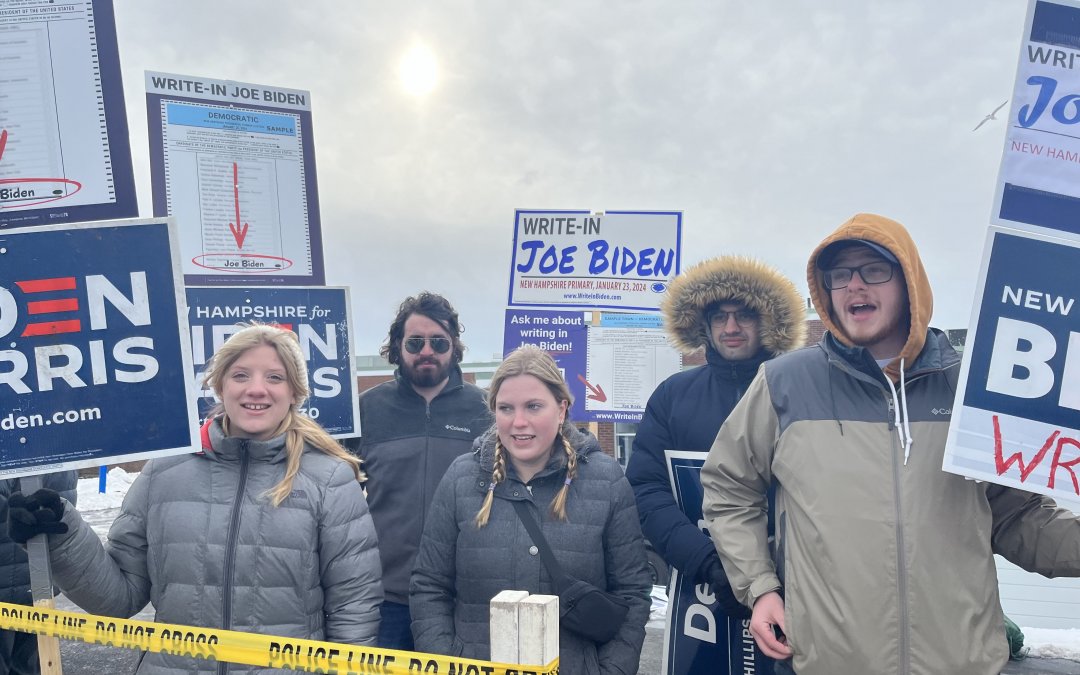Published Jan. 24; Updated Jan. 25
HAMPTON, N.H. – Pro-Palestinian activists organized an initiative to urge voters in the Democratic primary to write-in “ceasefire” on Tuesday in hopes of sending a message to President Joe Biden. But after the election, it’s not clear to some whether the effort had any meaningful effect.
The movement, named Vote Ceasefire, called on New Hampshire primary voters to use “the power of your vote” to demand a ceasefire in Israel’s war against Hamas that has resulted in a widespread bombing of the Gaza Strip that has killed more than 25,000.
The war in the Middle East has received heavy coverage in the United States recently and Biden is often criticized by pro-Palestinian activists for his broad support of Israel, which has led his administration to send hundreds of millions of dollars in equipment and supplies to the Israeli government.
The campaign was partly made possible after the Democrats shook up the order of the nominating calendar at Biden’s behest to make South Carolina the first primary in the nation, but New Hampshire Democrats defied the new rules and held a primary anyway on Tuesday.
Biden wasn’t on the ballot in the Democratic primary in New Hampshire, nor did he campaign there, but supporters mounted a write-in campaign, resulting in him winning more than 62% of the vote, according to the results posted Thursday from the Associated Press.
“Ceasefire” received 1,497 votes, according to data on Thursday from the Office of the New Hampshire Secretary of State. That was significantly fewer than the nearly 4,700 write-ins Nikki Haley received on the Democratic primary ballot, and also fewer than the 2,055 write-ins Donald Trump had from declared Democrats.
Across New Hampshire the write-in campaign took up very little space at polling stations and in voters’ minds, various political activists contended.
“I think I’ve seen about as many Gaza write-in signs as I have Pete Buttigieg write-in signs, which is not many,” said Harris Wallace, a student advocating for the Biden write-in campaign.
Others in New Hampshire who supported other campaigns expressed skepticism about the effectiveness of the message.
“I think that as far as policy goes, the most productive thing is to make your vote count,” said Sophia Hall, a student advocating for Biden. “I think by writing ‘ceasefire,’ I admire what they’re trying to do, but at the same time I think voting for the candidate that you think is going to deal with it the best is probably what’s going to create political action.”
According to a study on Annual Reviews, a nonprofit site that synethesizes research literature, “in most places and most of the time, only small fractions of the electorate” participate in protest voting like this. A movement like this without significant numbers is doomed to fizzle out.
Eric Morgan, who campaigned on behalf of Democratic candidate Dean Phillips, agrees that there are better ways to address the violence. He said writing “ceasefire” would be about as productive as writing “Mickey Mouse” on the ballot.
“Biden is not going to see all the ceasefire votes. They’re not going to send those to him,” Morgan said.
While some think Biden would be the best candidate to keep the Israel-Hamas conflict at bay, others see Trump as a worthy alternative.
“Nobody wants war,” Trump campaigner Linda McGrath said. “Four years of Trump, there was no war. I believe it’s because of peace through strength, I’ve always believed in that. ‘Speak softly and carry a big stick.’ People were afraid of Trump.”
Wallace and Morgan, however, both stressed that they supported Americans exercising the right to protest as a method of resistance. Traditional protests draw attention to issues in a way that protest votes cannot.
“If they just did a regular protest and went out in front of the White House like they’ve been doing, in doing that I think that would show a movement with energy, rather than a movement that is failing,” Wallace said.

